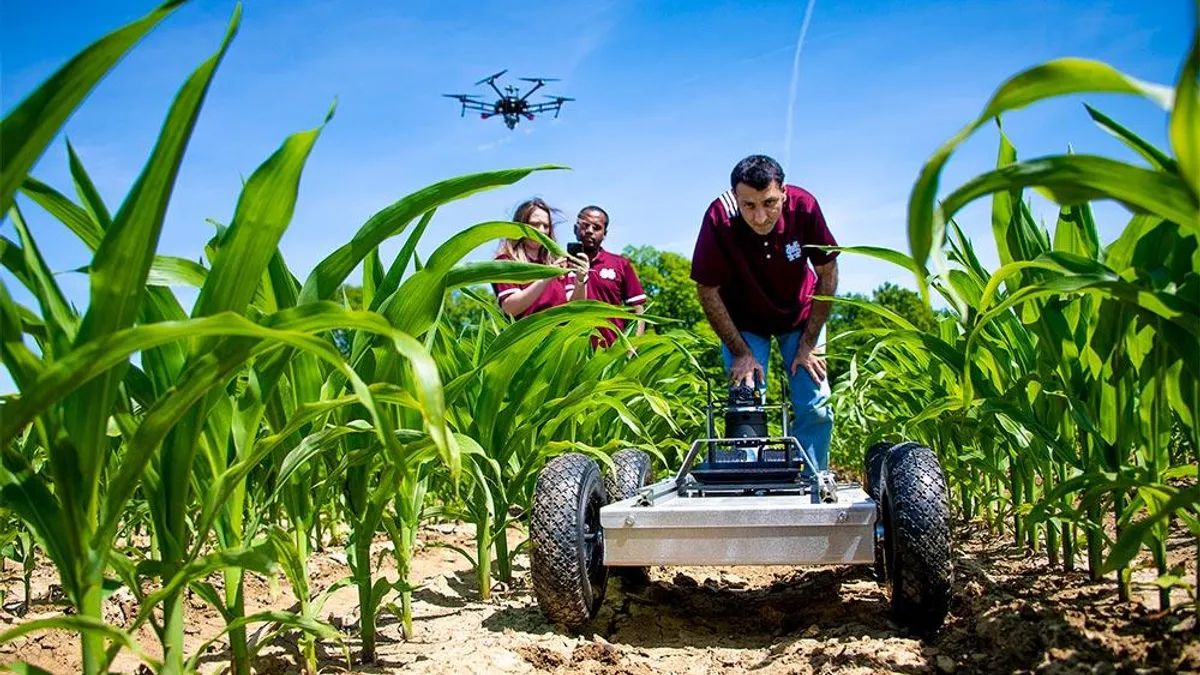Editor’s note: Agtech Seedlings is a weekly roundup of the latest in agriculture technology news, digging into venture funding, product announcements and other innovation milestones. Have news to share? Email us here.
John Deere partners with Mississippi State on automated cotton production
John Deere is partnering with Mississippi State University on a master research agreement to help develop automation technology for cotton and other crops.
Farmers have been turning to automation as a solution to bridge the labor gap, better manage costs and protect workers from extreme heat. Automation technology could also improve yields and farm management in a warming climate.
“Operating agricultural equipment in certain applications requires intense focus and attention to detail,” Hussein Gharakhani, the project’s principal investigator and assistant professor at MSU, said in a statement. “Imagine operating in such a situation all day, and you’ll understand how easy it would be to lose concentration and start making costly mistakes.”
Mississippi State has a mission to attract agriculture companies and create opportunities for research, startups and workforce development, according to a release. The project underscores a need for more research to be conducted in the South.
“Our cropping systems and methods are unique to our crops, soils, terrain and climate, so there are opportunities for manufacturers to work with researchers here in the specific conditions where their equipment will be used," said Alex Thomasson, director of the university's Agricultural Autonomy Institute.
John Deere has partnered with a number of universities to advance agricultural technologies as sales for traditional tractors and combines slow during a tough farm economy.
First black soldier fly larvae facility opens to optimize feed and fertilizer
Oberland Agriscience Inc has opened a 108,000 square-foot facility that farms black soldier fly larvae for nutrient-rich ingredients used in fertilizer and animal feed.
The farm, located in Halifax, Nova Scotia, Canada, scales the company’s ability to produce black fly larvae into animal feed, according to a release. The worms are also used to compost waste into nutrient-rich biomass used in fertilizers, creating a sustainable zero-waste approach to agriculture.
“Black soldier fly larvae are a tremendous insect, capable of transforming almost any organic matter into a valuable protein with almost unrivaled efficiency,” Dr. Greg Wanger, founder of Oberland Agriscience, said in a statement. “The food waste challenge isn’t going away and the demand for high quality protein continues to escalate.”
Oberland sells dried black soldier fly larvae as feed for backyard and commercial poultry, as well as for dogs and other pet species, according to its website. The company also sells an all-purpose fertilizer derived from the larvae that is suitable for hobby or commercial farming.
Nature’s Miracle rebrands subsidiary for agriculture EV market
Nature’s Miracle Holding Inc, a provider of vertical farming equipment and services, is looking to enter the agricultural electric vehicle market through a rebranding of one of its subsidiaries.
Hydroman, previously a supplier of LED lighting equipment for indoor growers, will become Hydroman Electric as part of a strategic rebrand and focus on the growing electric vehicle market, according to a release
Hydroman Electric is set to launch a new business focused on marketing and distribution of electric-powered agriculture vehicles and commercial vehicles across the United States and South America.
The development builds on a recent agreement with Robostreet, a Boston-based manufacturer of electric trucks, to convert 150 LS 450 vehicles into mobile vertical farms in Los Angeles that grow micro-greens and herbs.
James Li, chairman and CEO of Nature’s Miracle, said he’s encouraged by the company’s ability to adapt and diversify its business for the electrification economy, as well as generate “new revenue streams to increase value for all stakeholders.”
Nature’s Miracle sells grow lights and hydroponic products for indoor growers through its two wholly-owned subsidiaries Visiontech Group and Hydroman. The name change will take effect as soon as it's registered with the state of California.











